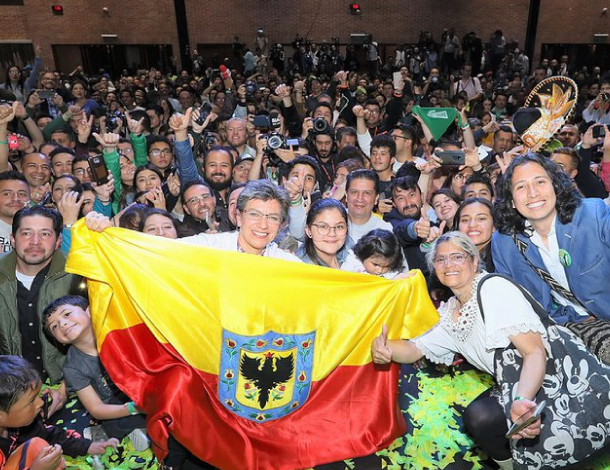On October 27, 2019, regional elections were held in Colombia and 49 year-old Claudia López was elected as the first woman and openly lesbian mayor. We spoke with writer and cultural promoter Yirama Castaño Güiza on the significance of this victory.
We’re not going back to the closet
When I saw the headlines coming out of Colombia, a huge smile spread across my face: for the first time a woman and openly lesbian politician was elected as mayor of Bogota. Her name is Claudia López and in no time at all, a photo of her celebratory kiss with her partner Angélica Lozano went viral.
López is the first openly lesbian woman to occupy such an important position in Colombian or in any other capital city of Latin America.
Since I began my lesbian-feminist activism and now as a non-binary person, visibility is key. What we don’t see and what we don’t name, doesn’t seem to exist. But, we do exist and demand our rights.
For Yirama Castaño Güiza, poet, journalist, cultural promoter, and out lesbian, Lopez’s victory “is the best news we could have received in the last decade, and the clearest achievement attained by women and the LGBTIQ community at the political, social and cultural level. It’s a direct response to the false double standard that pervades in our society.”

Castaño Güiza points out that in a city and country such as Bogota, Colombia, which is “conservative to its core, where exclusion, gender inequalities, discrimination against women, feminicides, gender violence, (including violence rooted in prejudice towards sexual orientation or gender identity) are ever-present realities of horror, the fact that Claudia Lopez won the election is another victory in the struggle for full recognition of the rights of the LGBTIQ community. It also symbolizes hope, a guarantee of sorts, that there is no turning back on the road to equality and that from now on, even though more struggles are in store, we know a space to act now exists, and one which we can pursue as far as the horizon.”
As Castaño Güiza states, there are many challenges facing the recently elected mayor (in Spanish), including for example, the renewal, development and implementation of the next LGBTI Public Policy Action Plan.
Leadership change
As Wilson Castañeda, Director of Caribe Afirmativo, stated in the El Espectador newspaper (in Spanish), this victory “is proof that leadership has been nurtured within the LGBT movement that not only responds to specific agendas within anti-discrimination struggles, but to a broader vision of country that aims for key transformations within non-corrupt, human development and social equity practices”.
Claudia López already has a long track record. In her own country, her constant work and dedication is not a novelty, as it is for those of us who don’t live there. Her love story with Angélica Lozano, a (Colombian) senator, has already challenged them many times, due to adverse reactions from the most conservative groups.
López came on the political scene in 2005, as Castaño Güiza recalls, “she was never afraid to denounce the link between politicians and paramilitary groups. Thanks to her tenacity, many of the most notorious offenders are today serving their sentences. Not only has she broken barriers and torn down walls, she has learnt to raise her voice over those who want to silence her. From within Congress as a senator, and outside as a citizen, she’s fought against corruption and led one of the most successful campaigns against this phenomenon, securing eleven million votes, though not considered representative enough to approve into law.”
Claudia Lopez's victory in this election demonstrates that she is in tune with the real problems of Colombia's citizens. During her campaign she not only spoke about the agenda of LGBTI communities, she also committed, under her government, to strengthen policies promoting gender equality and struggles against different forms of violence towards women and girls. She also supported struggles against structural racism and xenophobia (in Spanish) as well as recognition of Indigenous and Afro communities, and the effective inclusion of senior citizens and people with disabilities.
Deepening rebellion
As writer Castaño Güiza explains, the position to which Claudia López was elected is one that has been coveted by “the same electoral elites and traditional parties who have ruled the country for centuries”. “This is the position in which more resources have been plundered and redirected into the pockets of the corrupt; it’s the ladder which the elites use as a trampoline to get to the Presidency of the Republic. This time, however, those forces were defeated.”
As López stated in her victory speech, “Today a humble and diverse woman has for the first time won the second most important elected office in the country. Today Bogota voted to defeat machoism and homophobia. Let there be no doubt: change and equality are unstoppable”.
